Is Katie Ledecky swimming tonight? Updated Olympics schedule, results at
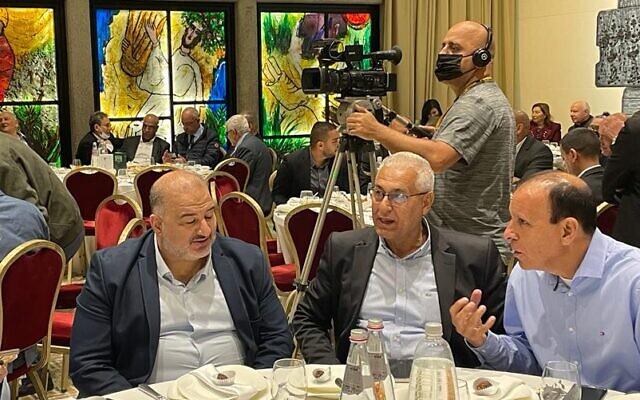
Politics and security mar the festivities at Herzog’s Iftar meal
President Isaac Herzog’s annual Iftar dinner, the traditional meal to break the Ramadan fast, brought around 200 guests to his official residence on Wednesday, including Israeli Arab public officials, religious and civil society leaders and members of the security forces.
Some foreign diplomats also attended the event at the President’s Residence in the capital.
But hanging over Herzog’s festivities and pleasantries were recent security incidents and political tensions, inescapable in the Jerusalem air. The government is teetering after its whip, Idit Silman of the right-wing Yamina party, quit her post last week, stripping the fragile coalition of its parliamentary majority, and a series of terror attacks have killed 14 people inside Israel in recent weeks.
At a table in the center of the hall for Herzog’s Iftar meal sat Mansour Abbas, leader of the coalition’s Islamist Ra’am party, and a Knesset member from the faction, Mazen Ghanaim.
“It’s not easy to be an Arab member of the Knesset in Israel. You have to swallow a lot. Your coalition partners want things and you have to swallow them,” Ghanaim said.
Last year, Ra’am broke with other Israeli Arab lawmakers, and with tradition, by joining the coalition in the hopes of advancing Arab community interests from inside the government. The party had to sit with factions that it was ideologically opposed to, including Prime Minister Naftali Bennett’s Yamina party, in a risky political gamble.
This new approach for Israeli Arabs in the government has received criticism from Arab society for not yet providing significant and tangible results.
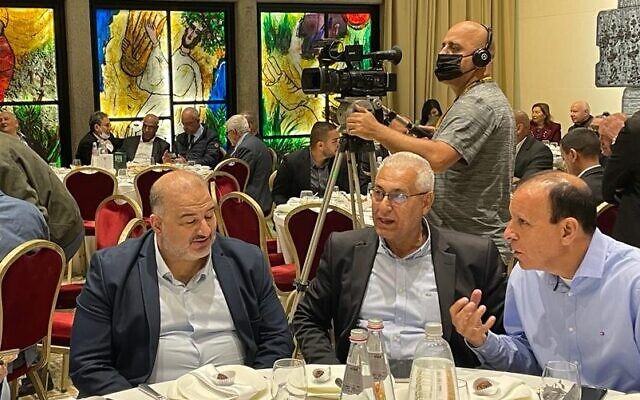
Ra’am MKs Mansour Abbas (center left) and Mazen Ghanaim (center right) at an Iftar dinner hosted by President Isaac Herzog at his Jerusalem official residence, April 13, 2022 (Carrie Keller-Lynn/The Times of Israel)
Sitting beside Ghanaim, his party leader Abbas acknowledged that nice rhetoric, such as Herzog’s at the meal, has not yet translated into results for his community.
“It’s a process,” Abbas said, adding that “this is all part of making things better.”
“When Herzog came into the presidency, he promised to deal with things that are still sensitive,” Abbas said. “When he talks about Islam and religion, it’s well-received by Arab society, and you can see he’s making an effort speaking Arabic, even with his accent you can see he’s trying.”
The discussion at Ra’am’s Iftar table came after Herzog delivered remarks in Arabic and Hebrew, in which he quoted the Quran, praised the month of Ramadan and highlighted the need for tolerance, while also addressing recent tensions.
“The month of Ramadan, the most beautiful and moving month in the Hijri calendar, reveals another aspect of the beautiful face of the Islamic spirit. This is a month of humility and piety, of moderation, of compassion and charity, of faith in God, of family and of community,” Herzog said.
“Even as a non-Muslim, I feel a profound sense of identification and connection with the special spirit of this month, which we mark here tonight,” he said.
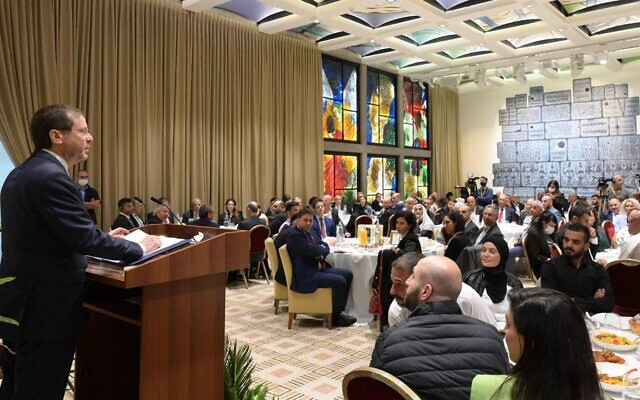
President Isaac Herzog (L) gives his remarks during an Iftar dinner hosted at his Jerusalem official residence, April 13, 2022 (Courtesy/President’s Office)
As a centerpiece, each table in the hall had a copy of the Quran, translated into Hebrew by the father of Herzog’s predecessor, Reuven Rivlin. Looking out over the packed room, Herzog quoted from the book, sharing from a chapter that aligned with his themes of tolerance and coexistence.
Herzog has stressed tolerance as a consistent theme throughout his tenure as president, and has made trips to Arab communities, both for public works and shows of support.
“Herzog came to Kafr Qasim, the site of a 1956 massacre that’s still a sticking point between Jewish and Arab society. Rivlin came in the past and said the right things, but it was different. You can tell Herzog cares. This is part of the healing process,” Abbas said.
That past violence merged with current events at the meal, as Herzog acknowledged the current terror wave in Israel.
“Friends, when acts of murder and violence are performed in the name of Islam, we must not be silent,” Herzog said.
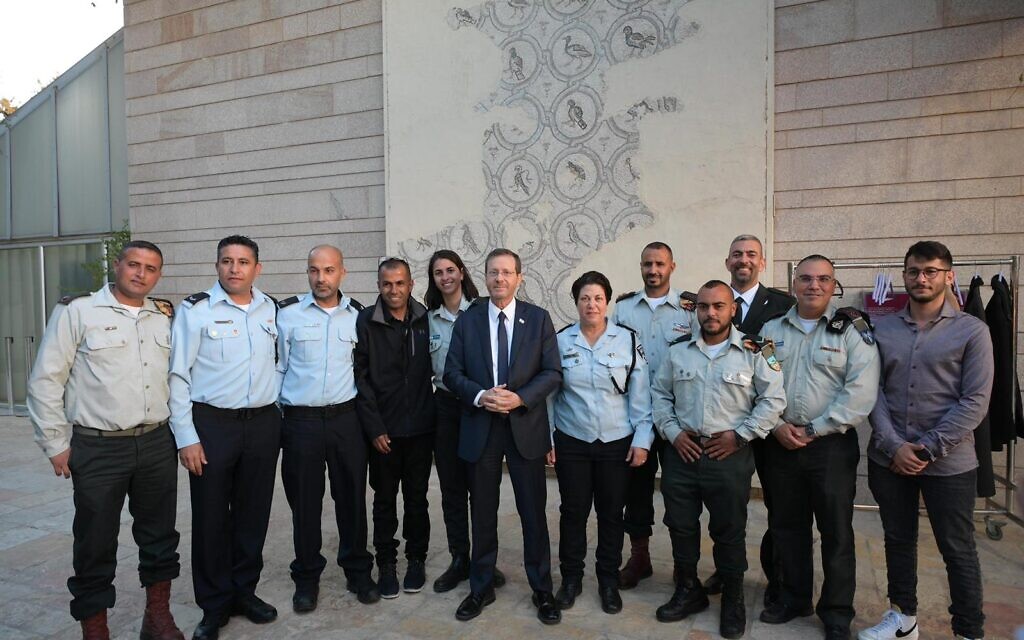
President Isaac Herzog with members of Israeli security forces at an Iftar Ramadan meal at the President’s Residence in Jerusalem, April 13, 2022. (Amos Ben-Gershom/GPO)
Ramadan this year coincides with both Easter and Passover, with the latter beginning on Friday evening.
Ahead of Passover, an extremist Jewish group offered money to Jews who go to the Temple Mount in Jerusalem, a holy site for both Jews and Muslims, and conduct a Biblical sacrifice. The stunt provoked some Muslims and drew a threat of retaliation from Hamas.
The Temple Mount, the holiest site in Judaism, is known to Muslims as Haram al-Sharif, and is the third-holiest site in Islam. Jewish presence there, today the site of Jerusalem’s Al-Aqsa Mosque, has long been a flashpoint for violence, and tensions climb during Ramadan.
“In recent days, mendacious reports have been circulating on social media about the Temple Mount and the holy sites. I want to take this opportunity to say: these are lies. Israel maintains the status quo on the Temple Mount,” Herzog said.
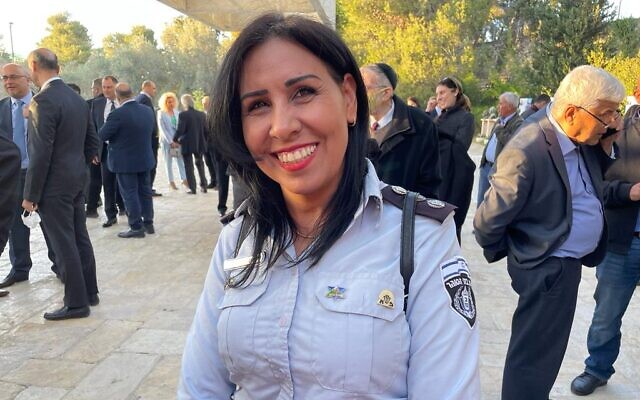
Corrections officer Einav Shibli at an Iftar dinner hosted by President Isaac Herzog at his Jerusalem official residence, April 13, 2022 (Carrie Keller-Lynn/The Times of Israel)
Einav Shibli, a corrections officer from a village in northern Israel also named Shibli, was one of several Muslim military and security service professionals at Herzog’s Iftar.
She said at the meal that recent political tensions had brought about hardship for her.
“We’ve had a difficult period,” she said.
On Sunday, the leader of the majority-Arab Joint List faction, Ayman Odeh, slammed Israeli Arabs in the state’s security forces, sparking outrage. A spokesperson for Odeh later clarified that the comments were directed to Israeli Arabs serving in East Jerusalem and the West Bank.
Shibli called Odeh’s comments “terrible.”
She said “it’s not easy where I live” to be accepted as a corrections officer in her Arab village, but that her neighbors have “gotten used to seeing me in uniform.”
Amir Mazarib, the local council chairman for the town of Zarzir in northern Israel, also highlighted current tensions at the Iftar meal, but with an eye to Jewish extremism.
“We’re proud to be citizens. It’s important to show the world that we love the country,” the Bedouin municipal leader said, adding that he spent 24 years in the military in combat and intelligence roles.
“But the state is like a father, and a father has to take care of all of his kids,” he said. “There are land problems and the country has to solve them. You can’t let someone live in a shack without water and electricity. So there are people who are bitter.”
Israeli Bedouin have long claimed neglect and mistreatment from the government, and have struggled to win recognition for some of their communities, which sometimes lack basic amenities. Abbas’s Ra’am party draws its support from souther Bedouin communities.
“Abbas is trying, but there are also people on the Jewish side that mess it up,” Mazarib said, pointing specifically to controversial Religious Zionism lawmaker Itamar Ben Gvir.
Ben Gvir has expressed extreme views about Arab Israelis and Palestinians, and among other inflammatory activities, has become an agitator in the tinderbox East Jerusalem neighborhood of Sheikh Jarrah.
“Ben Gvir is bringing more destruction to Israel than the Arabs are,” Mazarib said.
